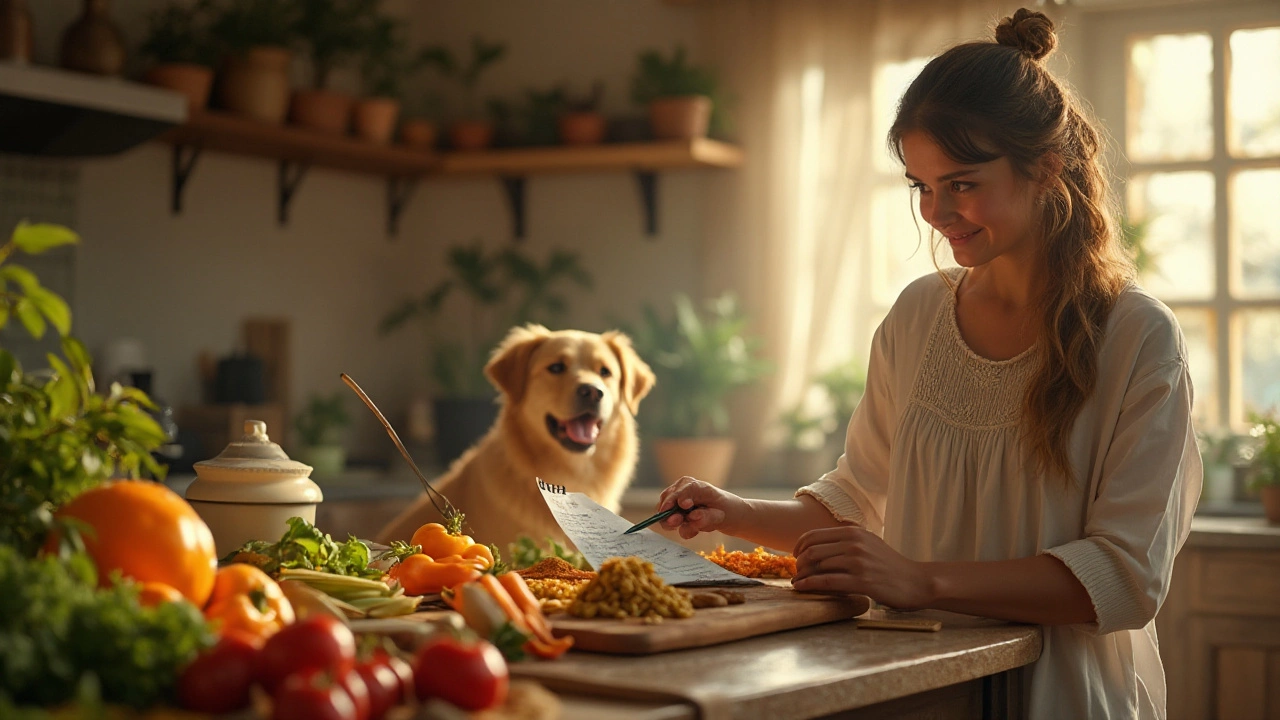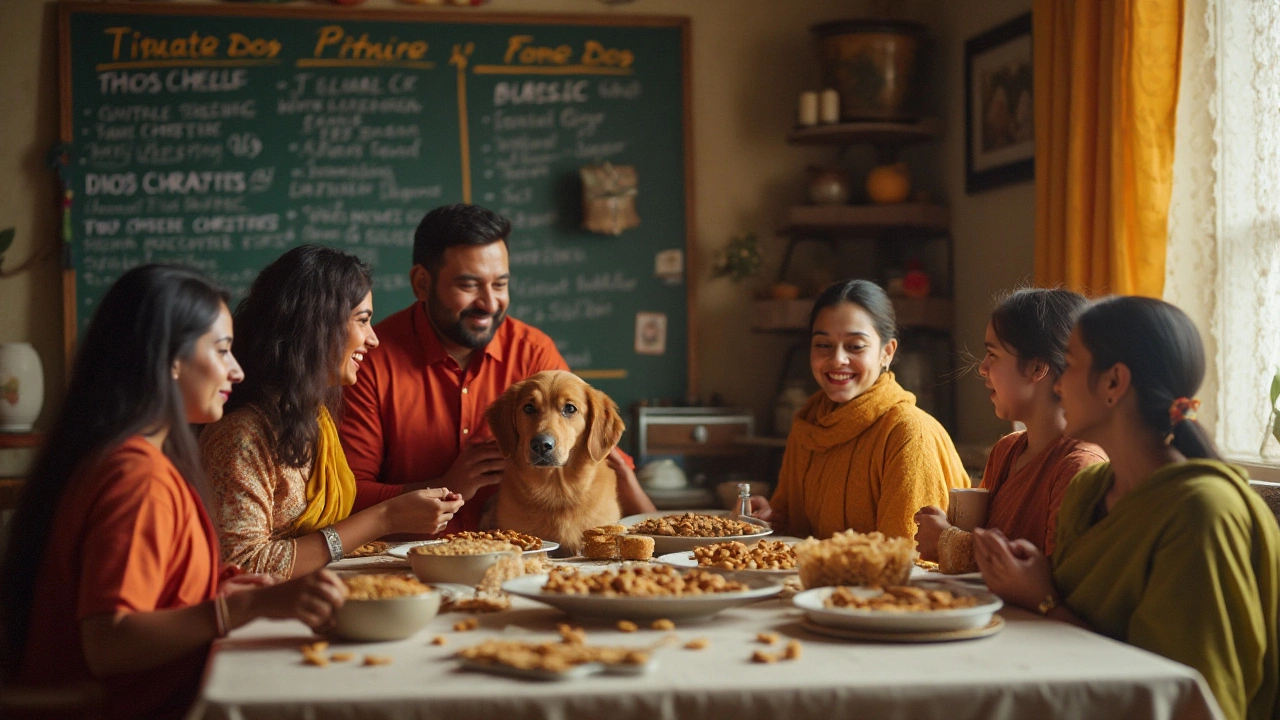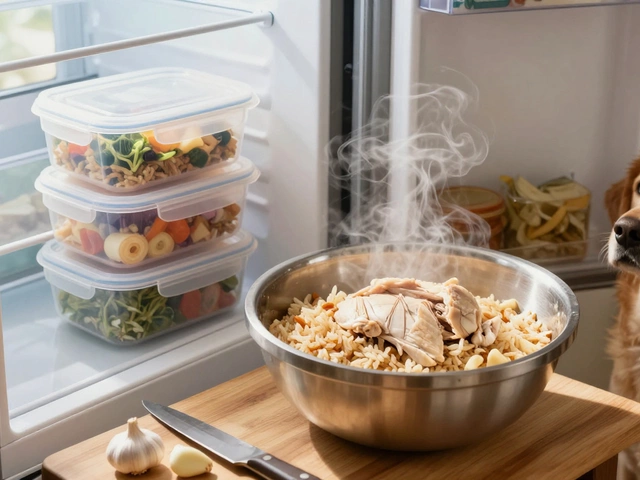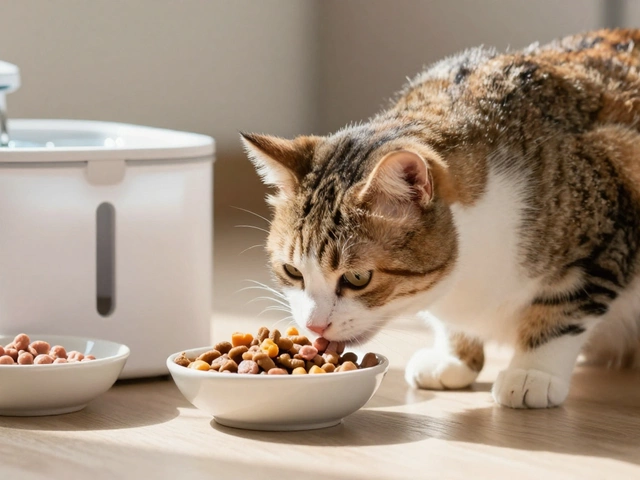
Preparing homemade meals for your dog connects you with their health in a meaningful way. But before you start, it's important to know what not to include in their diet. Some ingredients, while healthy for humans, can be harmful to dogs. Identifying these foods is crucial for their well-being. From specific fruits and vegetables to common household items, there's a list of foods you'll want to keep out of your furry friend's bowl.
By understanding what shouldn't go into homemade dog food, you ensure your pet's diet supports their health rather than unwittingly causing harm. This knowledge not only safeguards their nutrition but also helps in crafting meals that are both safe and nutritious. Let's embark on this journey of gathering the know-how on what ingredients need to be excluded from your dog's diet.
- Understanding Dog Nutrition Needs
- Hazardous Foods to Avoid
- Safe Substitutes for Your Recipes
- Consulting with Veterinarians
- Balancing Homemade Meals
Understanding Dog Nutrition Needs
Grasping the essentials of dog nutrition is paramount when diving into homemade diets for your furry companions. Each dog, depending on its age, size, and breed, can have unique nutritional requirements that vary considerably. At the base of every healthy dog diet, proteins play a critical role as they provide the essential amino acids dogs cannot synthesize on their own. Proteins fuel muscle construction, support an optimal immune system, and enable various bodily processes. It's vital to source these proteins from high-quality meats such as chicken, beef, and fish, while also considering healthier, lesser-known options like quail or venison to vary their diet.
Carbohydrates often spark debates among pet nutritionists. While some argue dogs don't need them as carnivorous animals, carbs can supply dogs with a much-needed burst of energy. Whole grains like brown rice or oats, as well as potatoes, can count as viable sources. The key for dog owners lies in balancing these carbohydrates with proteins and healthy fats, which make up another essential part of a dog's dietary foundation. Fats, particularly omega fatty acids, contribute to a gleaming coat, healthy skin, and cognitive functions.
Vitamins and minerals cannot be neglected either in any nutritional equation. They may often come across as tiny players due to their required quantities, yet they're pivotal in promoting overall health. Leafy greens like spinach, coupled with vegetables such as carrots or pumpkin, can furnish essential vitamins like Vitamin A, C, and K, while also delivering fiber that aids digestion. In addition, calcium is vital for strong bones, which can be incorporated through dietary supplements or natural options, such as a bit of yogurt or cheese.
"A balanced diet is as important for our pets as it is for us, and it is essential to understand their nutritional needs to ensure long-term health and happiness," notes Dr. John Doe, certified animal nutritionist.
Balancing homemade meals often requires more than the naked eye can discern, prompting the necessity for consultation with veterinary professionals. A nutrient-rich meal plan should consider all aspects of an animal's health: physical condition, activity levels, and any underlying health issues. Paying close attention to caloric intake is another crucial aspect. Feeding a sedentary pooch similar portions to those of high-energy breeds can lead to obesity, a growing problem in the canine world.
Implementing a nutrition plan for dogs isn't just about following dietary rules; it's about responding to the specific needs of each unique pup. Regular assessments and tweaks are necessary while keeping an observant eye on how your dog's body responds over time. The road to understanding dog nutrition is ongoing—a journey marked by learning, adjusting, and thriving together with your beloved companions.
Hazardous Foods to Avoid
Understanding what foods are harmful to your dog is a key part of creating a safe and healthy homemade diet. Dog food must exclude certain ingredients that are common in our own diets but can pose significant risks to our furry companions. For example, chocolate, beloved by many of us, is a big no-no for dogs. It contains theobromine, which can lead to severe medical issues, including heart arrhythmias, muscle tremors, or even seizures in dogs. Similarly, alcohol, even in small amounts, can lead to ethanol poisoning. This could result in anything from mild disorientation to more critical conditions such as decreased coordination, vomiting, and seizures. Our canine friends process substances differently from us, so what's safe for us might not be safe for them.
Grapes and raisins may seem healthy, yet they are toxic to dogs. Even small amounts can cause dangerous reactions like vomiting and, in severe cases, kidney failure. Onions and garlic, whether raw, cooked, or powdered, can lead to anemia in dogs by damaging their red blood cells. People often don't realize that these ingredients, frequently used to add flavor to our meals, are harmful to dogs. When cooking for your canine, it's vital to ensure that anything with an onion or garlic component is avoided entirely. The same caution extends to most artificial sweeteners such as xylitol, commonly found in sugar-free foods. Xylitol can cause a rapid insulin release in dogs, leading to low blood sugar and potential liver failure.
But it's not just these well-known examples. Avocados contain persin, which, while more toxic to birds and large animals, can still upset a dog's stomach. Macadamia nuts, another seemingly innocent snack for humans, can lead to weakness, overheating, and swollen limbs in dogs. Coffee and other caffeine sources should be a clear no as well, due to their potential to cause restlessness, rapid breathing, and heart palpitations. It's essential to be aware of these everyday items that lurk in your kitchen as inadvertent dangers to dogs.
"A healthy dog diet excludes foods such as grapes and chocolate because of their toxicity," points out Dr. Amanda Abelson, a leading veterinary nutritionist. "Avoiding such 'human' foods is just as important as adding balanced nutrition to a dog’s meal."
Then there is milk and dairy products which, while not explicitly dangerous, can cause digestive issues due to lactose intolerance in some dogs. Consistency in feeding and knowing the potential hazards contribute significantly to your dog's health. Always keep an eye on how specific foods affect them, and when in doubt, seek out advice from a veterinarian. Safe homemade meals are about creating a delicious and nutritious experience for your dog without putting them at risk.Dog health is all about cultivating a diet that sidesteps these hazards while focusing on what truly benefits their body. Awareness and education around food safety are as crucial as the loving care you put into each meal.
It's worth knowing these hazards since many ingredients we casually consume can be detrimental to our dogs. With simple adjustments and awareness, you can ensure that your pet enjoys every meal while steering clear of harmful foods. It's a significant step towards happy, healthy lives alongside their human families.

Safe Substitutes for Your Recipes
Crafting homemade meals for your dog can feel like a culinary adventure, but it's crucial to replace harmful ingredients with safe and nutritious options. Recognizing ingredients that are dangerous to our four-legged companions, such as chocolate, onions, and grapes, calls for thoughtful substitutions. For example, instead of grapes, opt for blueberries, which are rich in antioxidants and completely safe for your dog. When considering protein sources, swap out fatty cuts of meat with lean options like chicken or turkey. Both are excellent and easily digestible alternatives for your furry friend's meal. Remember, it's not just about swapping food but ensuring it suits your dog’s dietary needs.
Another key substitute to consider is using white rice or quinoa in place of foods like pasta, which may cause dietary distress in some dogs because of its gluten content. Both white rice and quinoa offer a high-energy source and are gentler on your dog's stomach. They can be a great foundation for your homemade dog food recipes, providing the carbohydrate component dogs require for energy. Sweet potatoes are another superb alternative offering fiber and vitamins A, B6, and C, which aid in supporting your dog's immune system and digestion. As you experiment with various ingredients, always keep your dog’s individual health requirements in mind, as breeds and sizes can have varying dietary needs.
For those considering adding vegetables, avoid harmful ones like onions and garlic, and replace them with safe, nutrient-packed options like carrots and peas. Carrots are an excellent replacement, filled with vitamin A for vision and skin health. Peas bring in fiber and protein, making them a delightful addition to your pet's meal plan. When implementing these vegetables, ensure they are cooked and chopped in bite-sized pieces to aid digestion and prevent choking hazards.
According to Dr. Karen Becker, a proactive and integrative wellness veterinarian, "When properly balanced, homemade pet meals can add years to your pet’s life." This underscores the importance of being mindful of what goes into their bowl, emphasizing safe and healthy substitutes.
If you're considering herbal supplements, steer clear of any unknown herbal products. Opt for known safe herbs such as parsley for freshening breath and improving digestion, or turmeric, which contains anti-inflammatory properties. Also, consider adding coconut oil as part of your healthy fat component, offering skin and coat benefits while enhancing flavor. It's essential to measure and work these substitutes into your recipes properly, ensuring balanced nutrition and portion control. Always stay informed with continual learning and consultation with your vet to keep your furry friend in optimal health.
Incorporating these substitute ingredients not only nurtures your dog’s diet but also brings pleasure in knowing that mealtimes are contributing to their happiness and longevity. It's a journey of experimentation and discovery, tailoring meals to adjust and perfect them as per your individual dog’s responses and needs. With creativity and vigilance, you'll ensure your homemade dog food is not just a meal, but a nourishing experience for your beloved pet.
Consulting with Veterinarians
When venturing into the world of crafting homemade meals for your beloved pet, consulting with veterinarians is a crucial step that should not be underestimated. A dog's dietary needs are far more complex than they might seem at first glance, and it's vital to ensure you are making decisions that will promote their health rather than detract from it. Veterinarians can offer invaluable insight into what specific nutrients are essential for your dog's particular breed, age, and health status. They can also highlight any medical conditions your pet might have that could influence their diet, such as allergies, obesity, or diabetes. This professional input is geared to help you tailor-make meals that are both nutritious and safe.
It’s no secret, veterinarians have firsthand experience with both the successes and failures of homemade dog food. Their expertise plays a pivotal role in ensuring that your dog receives a balanced diet that replicates the nutritional content typically found in commercial dog food. Veterinarians are well-versed in canine nutrition and can offer practical guidance on what type of meats, grains, vegetables, and supplements should be included to achieve an ideal dietary balance. Having this level of understanding is key to ensuring your pet’s diet is comprehensive, covering all the necessary vitamins and minerals.
A dialogue with your veterinarian can also help in assessing the viability and safety of your dog's diet in the long term. They may provide recommendations for periodic health checks, ensuring that your dog's weight, coat condition, and overall energy levels remain optimal and reflective of a healthy diet. These health checks can potentially catch any deficiencies or excesses in nutrients early, allowing for adjustments before any serious health issues arise. Reinforcing the importance of veterinary guidance, Dr. Karen Becker, a renowned integrative wellness veterinarian, states:
"The best food for your pet is one that is sourced and prepared with the same care and quality controls you would expect to see in a human food line."
Moreover, veterinarians can offer advice on what supplements, if any, might enhance your homemade recipes. This ensures that your dog food not only avoids potentially harmful ingredients but also provides all essential nutrients. In some cases, this might mean incorporating specific dog health supplements to fill any nutritional gaps. Their input is especially important if you're dealing with a dog that has special dietary needs, as improvising without professional guidance could lead to imbalances or deficiencies that could compromise your pet's health. By tapping into the expertise that veterinarians offer, pet owners can feel confident that their efforts in preparing homemade meals are truly beneficial for their furry companions.

Balancing Homemade Meals
Creating a balanced homemade diet for your furry friend involves more than just throwing together a mix of household leftovers. An optimal diet for dogs requires a delicate balance of proteins, carbohydrates, fats, vitamins, and minerals. Proteins are pivotal as they support muscle growth and repair, with meats like chicken, lamb, and fish often serving as a fine choice. Yet, simply relying on protein isn't sufficient. Carbohydrates, sourced from brown rice or sweet potatoes, provide the much-needed energy and fiber to maintain your dog’s vitality.
Although it might be tempting to include an array of foods to add diversity, the key is moderation in ingredients and ensuring core dietary needs are met without overloading on any one nutrient. The fat intake should also be watched; while fats are essential for absorbing fat-soluble vitamins and add taste to meals, too much can lead to obesity-related problems. Incorporate healthy fats through options like fish oil or flaxseed oil, which can boost your dog's coat and skin health. Use a veterinary-approved supplement if necessary to ensure they're getting all required nutrients without overdoing any element.
Many pet owners find it challenging to adjust portions accurately. This is where consultation with professionals becomes invaluable, not only for devising the ideal meal plan but also in dispensing advice tailored to your pet's activity level, age, and health condition. One respected source, Dr. Julie Churchill, a veterinary nutritionist at the University of Minnesota, once noted, “Feeding a nutritionally balanced diet is the single most important thing an owner can do for their pet's health.”
Ensuring homemade meals hit the mark on balanced nutrition can prevent health dilemmas and expensive vet visits, making every mealtime a step towards longevity.Additionally, statistics show that over 50% of dogs are overweight, spotlighting the need for mindful portion control and balance in their meals.
Certainly, paying heed to your dog's special dietary needs adds another layer to meal planning. Whether they struggle with allergies, require calorie restrictions, or need joint support — integrating their specific needs makes a tremendous difference. Testing recipes on a smaller scale first can prevent wastage and gives an opportunity to observe your dog’s response to new meal compositions. As an important tip, maintain detailed notes on any modifications and reactions observed; this can make readjusting recipes much easier and effective.
It's beneficial to outline the meals across the week using structured plans to ensure consistency. You might focus on using different protein sources across different days to keep meals interesting yet balanced. For those new to homemade food, starting with a simple base and gradually expanding can prevent overwhelming both the pet owner and the dog. Remember, variety should not come at the expense of balance, ensuring every bowl is not only a meal but a nutrient-complete source of nourishment. Embracing the multifaceted process of crafting homemade dog food can be both artful and scientific, nurturing your dog's health in the most personalized way possible.





